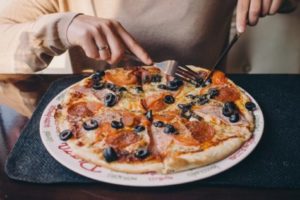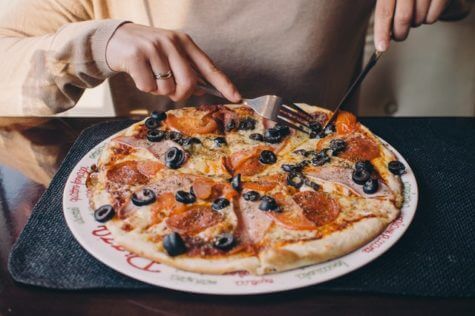FUKUOKA, Japan — If you want to shed some pounds without changing what you eat, try changing how you eat. A new study finds that three simple eating habits could make all the difference when it comes to fitting into those older, tighter pants collecting dust in your closet.
Researchers from the Kyushu University Graduate School of Medical Sciences say people who eat their meals slowly, avoid nighttime snacking, and don’t go to sleep until at least two hours have passed since dinner are more likely to see their waistlines shrink.

For the study, the researchers obtained data from regular checkups of 59,717 Japanese men and women diagnosed with type-2 diabetes during 2008 and 2013. In addition to having their BMI and waistlines measured, they also submitted blood and urine samples, and completed questionnaires on their health and lifestyles.
The surveys included questions on eating and sleeping habits, including a self-assessment of how fast the participants ate food, how soon they went to bed after dinner, and the frequency with which they snacked at night. About 37 percent admitted gobbling down their meals quickly, while only 7 percent took his or her time with each bite.
Upon their first checkups, the researchers found the small minority that ate slowly tended to show healthier lifestyles than those who ate fast or at normal speeds. About half of the participants admitted in followups that they’d changed their eating speed during the study period. After eliminating any factors that might influence a person’s risk for obesity, the authors found that people who ate at a normal speed were 29 percent less likely to be obese, while the slowest eaters saw a 42 percent risk reduction. Similarly, normal and slow eaters were more prone to having smaller waist sizes.
One possible reason, the authors write, for the result could be “that fast eaters may continue to eat until they feel full despite having already consumed an adequate amount of calories, and the combined effect of eating quickly and overeating may contribute to weight gain. In contrast, eating slowly may help to increase feelings of satiety before an excessive amount of food is ingested.”
The researchers also found that participants who, at least three times a week, continued to eat snacks after dinner or went to bed less than two hours after dinner showed worsened BMI measurements.
“The major finding of this study is that changes in eating speed can affect obesity, BMI and waist circumference,” conclude authors Yumi Hurst and Haruhisa Fukuda. “The control of eating speed may therefore be a possible means of regulating body weight and preventing obesity, which in turn reduces the risk of developing non-communicable diseases.”
Hurst and Fukuda point out, however, that the study results were based on observation and self-assessments, and physical activity levels weren’t taken into consideration. Naturally, those who make regular workouts a priority likely had an easier road to weight loss versus more sedentary individuals.
The study’s findings were published in the journal BMJ Open.

I buy it. I am on a mission to lose weight. So far so good. But I think this will help. I will now eat slower and not eat within say 2 hours of going to bed. This thing can’t hurt so why not?. My snacking is not a real problem. If I snack at all its a piece of very rich chocolate. I enjoy it but one does not want to keep eating really rich chocolate.
I wish you luck. Another good tip is to eat lots of vegetables and fruit, lots of protein, but very little complex carbohydrates like bread and pasta. When I wanted to loose weight, I did what I called the superfood diet. I ate as many superfoods (google it) as possible each day, and any bread I ate had to be high fiber. I lost weight so fast I ended up winning a contest at work. I lost 20 pounds in 3 weeks and never felt hungry. Eating superfoods will cut down on cravings.
too much protien is bad for you. Fat is the most important food you can eat, you’re right CARBS are the culprit. research LCHF
I’ve never had a weight problem and I am the slowest eater in the world. Hmmmmm………
I’ve never had a weight problem and I eat super fast, from my military habit.
Me too on both counts!
This is pretty easy to understand. Your stomach has to signal your brain that it’s full, and it takes a while. If you eat fast, you end up eating a lot more than you would if you ate slowly, simply because your stomach has not had time to signal your brain.
I will look into it. Thanks
Bleeb i read something similar about 30 years ago.
Good researchers. I was diagnosed with type 2 Diabetes and put on Metformin on June 26th, 2017. I started the ADA diet and followed it 100% for a few weeks and could not get my blood sugar to go below 140. Finally i began to panic and called my doctor, he told me to get used to it. He said I would be on metformin my whole life and eventually insulin. At that point i knew something wasn’t right and began to do a lot of research. Then I found Lisa’s diabetes story (google ” How I freed myself from diabetes ” ) I read that article from end to end because everything the writer was saying made absolute sense. I started the diet that day and the next week my blood sugar was down to 100 and now i have a fasting blood sugar between Mid 70’s and the 80’s. My doctor took me off the metformin after just three week of being on this lifestyle change. I have lost over 16 pounds and 3+ inches around my waist in a month. The truth is we can get off the drugs and help myself by trying natural methods
Blah, blah, blah, blah, blah.
It’s all B.S.
How about eat how and when you like, but don’t eat like a fuqing pig and shovel copious amounts of food down your fat throat.
Don’t finish everything on your plate.
Don’t go for seconds.
Don’t be a fuqing pig and you won’t get fat.
Always thought so too. I watched The Biggest Loser a few times and there it was, as clear as can be: eat less and move around and you won’t remain fat.
Bingo !
People who maintain those habits are likely to maintain healthier habits in general. Correlation does not equal causation.
Don’t eat so much food and you won’t be obese like everyone else in society is the real key. Or, don’t equate happiness and health with being a fat pig, this is probably you reading this fatty.
Next 300 page diet book…it slower and get trimmer.
Yet another self-reporting, observational dietary study summed up in an article where correlation is presented as causation. Sounds reasonable, but I wouldn’t build a dietary plan around it. This kind of study is notorious for being about as methodologically as a palm reading.
I am self-reporting that if you get a tooth pulled out and it hurts and makes your mouth miserable, you’ll probably eat less for at least a week and might lose a pound or two.
A few more tips:
1. Avoid anything that contains NutraSweet (diet soda, etc.). NutraSweet interferes with the signal that tells you that you are full. It makes you eat more.
2. Avoid anything that contains corn syrup, and high-fructose corn syrup, because it also interferes with the Full signal.
3. Avoid all vegetable oils (corn, soybean, peanut, canola, safflower, sunflower). Not only do vegetable oils contribute weight gain, but they also disrupt and mutate cellular structure, increasing your chance of cancer and heart disease. Use only animal fats, like butter, lard and beef tallow, which are natural fats. Coconut oil is ok. Olive oil is ok, but only if you are careful to verify that it is not adulterated with vegetable oils, which is often the case.
4. Avoid eating processed foods, which contain harmful substances, including those listed above.
More tips:
1. Avoid any food or liquid containing aspartame or corn syrup. Both shut off the signal that tells you that you are full.
2. Avoid all vegetable oils (corn, soybean, peanut, canola, rapeseed, safflower, sunflower, and vegetable shortening. They are NOT naturally occurring oils, and will harm your cells. Veg oil is made using crushed seeds, heat, deodorant, and a petroleum solvent called Hexane. Use only animal fats, such as butter, beef tallow, and lard. Coconut oil is ok. Olive oil is ok, if you are careful to verify that it is not adulterated with cheaper vegetable oils, which is often the case.
3. Avoid eating processed foods, which contain harmful substances including those listed above.
Well said, Bad Will! Eat in moderation and avoid ANYTHING that’s made using chemicals in a lab and is not grown naturally.
Good advice LCHF… check out
diet doctor . com
WAIT So, the study says
DONT BE AN IDIOT?
And you will loose weight??
NO WAY !! !! !
Scarf your food down! Get fat!! Live!!!
I like to eat vag. Low in calories!
Taste good too, usually.
The one case where you ARE NOT what you eat.
Of course, you’re not swallowing though.
Eat only two meals a day, the first two hours after you wake up and the last about 5 hours before you go to sleep. In between drink tea, coffee, or lemon aide sweetened with Splenda or stevia. Take a good vitamin. Walk about 30 minutes a day as your exercise, at least – or bike if you are up to it. Problem solved. (And when you eat you may eat as fast as you wish – that is not even relevant). Oh yeah – drink plenty of water throughout the day.
if you give up carbs you can get by with only one meal a day and get a life away from food obsession
Tea is good too.
Many years ago I was stuck in line at the supermarket when I glanced at the National Enquirer in the magazine rack. One headline read “Loose Tons Of Weight In No Time With The Fantastic Chopstick Diet!”.
My first thought was, “what kind of National Enquirer nonsense is this”? But since I had some time to kill, I glanced at the article and, to my surprise, it made a lot of sense. Point is, most people, especially Westerners, tend to eat more slowly with chopsticks than with a fork or spoon. The article then pointed out (seemingly missing in this piece) is that it takes about 10 minutes or more for the satiety message, sent by nerves in the stomach, to reach the brain.
If you’re wolfing down food like there’s no tomorrow you tend to keep eating long after your stomach says it’s full.
PS: Just noticed your post, MrReasonable and, of course, I agree!
Secret to not gaining weight is to poo more.
Thanks Captain Obvious!